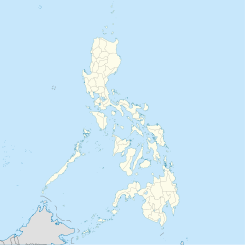The Simborio is a dome-shaped structure at the center of Sta. Ana Cemetery in Taguig in the Philippines. It was built by the Filipinos during the 18th century through the supervision of Spanish Friars.[1]
| Simborio | |
|---|---|
 The Simborio in 2020 | |
| 14°31′45″N 121°04′24″E / 14.5293°N 121.0734°E | |
| Location | Tuktukan, Taguig |
| Country | Philippines |
| History | |
| Founded | 1700 |
| Architecture | |
| Architectural type | Dome |
| Specifications | |
| Diameter | 12 meters |
Architecture
editThe dome's walls were made of stone and its diameter measures 12 meters. A small cross is situated on top of the dome. It has an 11-step stairway with rails on the left and right side leading up to an arched entrance door which is made of welded iron. A narrow patio surrounds the entire dome. Inside it, a small altar is found.
There are only two windows, both with iron vertical bars. Stacked tombs of up to three levels high are situated below the dome.
Renovations and present situation
editSome minor renovations were done to the Simborio in 1980 and 1993.[1] At present, the dome is used as storage of construction materials. Plants continue to sprout in the stone walls, covering the left part of the dome and roots are visibly attached to the walls inside the dome. Vandalism is manifested in both its interior and exterior walls.
Gallery
edit-
Left side of the Simborio
-
Rear of the Simborio
-
Right side of the Simborio
-
Window on the left side
-
Window on the right side
-
Plant roots penetrating the walls
-
Interiors of the Simborio
-
Inside the Simborio, topmost
-
Rear of the entrance door
-
Balcony
See also
editReferences
edit- ^ a b "Taguig Landmarks". Taguig City Official Website. Archived from the original on 12 October 2013.
External links
edit- Media related to Simborio (Taguig City) at Wikimedia Commons


